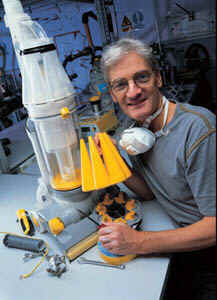 James Dyson is the inventor of the successful and now common Dual Cyclone bagless vacuum cleaner. I did a session yesterday on design thinking with a group of executive MBA's yesterday. One who had consulted to the company pointed out that Dyson — supported by his wife's job as an art teacher — took five years and 5127 failed prototype to develop on that worked. If failure sucks but instructs, that is a lot of learning. It also is an interesting case because it shows how difficult it is to make rational decisions in the innovation process. Certainly, say 4000 prototypes and 4 years into the adventrue, any reasonable person would have assumed that this was a failure, an extreme case of escalating commitment to a failed course of action. As I have written here before, James March described this aspect of creativity elegantly:
James Dyson is the inventor of the successful and now common Dual Cyclone bagless vacuum cleaner. I did a session yesterday on design thinking with a group of executive MBA's yesterday. One who had consulted to the company pointed out that Dyson — supported by his wife's job as an art teacher — took five years and 5127 failed prototype to develop on that worked. If failure sucks but instructs, that is a lot of learning. It also is an interesting case because it shows how difficult it is to make rational decisions in the innovation process. Certainly, say 4000 prototypes and 4 years into the adventrue, any reasonable person would have assumed that this was a failure, an extreme case of escalating commitment to a failed course of action. As I have written here before, James March described this aspect of creativity elegantly:
the gains for imagination are not free. The protections for imagination
are indiscriminate. They shield bad ideas as well as good
ones—and there are many more of the former than the latter. Most
fantasies lead us astray, and most of
the consequences of imagination for individuals and individual
organizations
are disastrous. Most deviants end up on
the scrap pile of failed mutations, not as heroes of organizational
transformation. . . . There is, as a result, much that can be viewed as
unjust
in a system that induces imagination among individuals and individual
organizations in order to allow a larger system to choose among
alternative experiments. By glorifying imagination, we entice the
innocent into unwitting self-destruction (or if you prefer, altruism)."
If you want to learn more about Dyson's quest, I suggest his autobiography, Against the Odds.